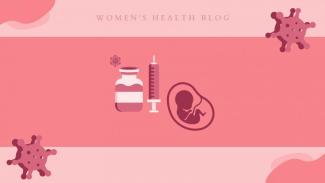Authors: Sue Lu, BSc student in Integrated Science at the University of British Columbia and Research Assistant at the Vaccine Evaluation Centre; Manish Sadarangani, MRCPCH, DPHIL, BM.BCh, MA, Director of the Vaccine Evaluation Center at BC Children's Hospital and Associate Professor in the Department of Pediatrics at the University of British Columbia Authors/Editors: Romina Garcia de leon, Shayda Swann (Blog Co-coordinators).
Published: April 21st, 2023
The COVID-19 pandemic has disproportionately impacted pregnant people. If a pregnant person is infected with SARS-CoV-2, the virus that causes COVID-19, they are at a higher risk of severe disease, hospitalization, intensive care unit admission, and death. COVID-19 infection in pregnant people can also cause poor pregnancy outcomes, such as preterm birth and impaired fetal growth. As found by UBC researchers through the CANCOVID-Preg surveillance program, even cases of mild COVID-19 infection not requiring hospitalization were significantly associated with a higher risk of preterm birth. In short, COVID-19 is not only threatening to the mother, but to the unborn child as well.
What did we know about the safety of COVID-19 vaccines in pregnancy?
COVID-19 vaccines have been available in Canada since December 2020. Experts recommended COVID-19 vaccines during pregnancy based on smaller studies of other mRNA vaccines in pregnancy and several decades of administering vaccines in pregnancy. Unfortunately, despite the continued recommendations from experts to get vaccinated, many pregnant people remained hesitant about the COVID-19 vaccines. In fact, recent studies suggest that 49% of pregnant women were accepting of COVID-19 vaccines.
How did we conduct this study?
This study was conducted through the Canadian National Vaccine Safety (CANVAS) Network. The CANVAS Network is a national research platform that monitors the safety of vaccines, including COVID-19 vaccines, in Canada. This study, led by Dr. Manish Sadarangani, looked at the frequency and nature of severe health events following vaccination in pregnant people. Severe health events, as defined by this study and other CANVAS Network studies, are issues that arise following vaccination that are severe enough to prevent people from going to work or school, or required medical attention.
At the time this study was conducted, over 700,000 total participants and 5,500 pregnant individuals had enrolled from seven provinces and territories across Canada. We looked at female participants of reproductive age and compared how pregnant people reacted to their first and second doses of the COVID-19 vaccines in unvaccinated pregnant people and vaccinated non-pregnant people.
Overall, this CANVAS Network study allowed us to better understand COVID-19 vaccine safety by looking at changes to health after vaccination for pregnant people and comparing their changes to those of similar vaccinated and unvaccinated groups.
What did we learn?
Our study’s findings confirmed that COVID-19 mRNA vaccines are safe to use in pregnancy. Additionally, other studies show them to be both effective and immunogenic, meaning they can protect both the mother and the child from COVID-19 infection. Here are three of our major safety findings:
- COVID-19 mRNA vaccine reaction differences between pregnant and non-pregnant individuals: When we compared pregnant and non-pregnant vaccinated individuals, we found that pregnant people experienced fewer symptoms that prevented daily activities, prevented work, or required a medical visit than non-pregnant people.
- COVID-19 mRNA vaccine reaction differences between vaccinated and unvaccinated pregnant individuals: There was no difference in hospitalization or pregnancy-related complications in these two groups, suggesting that vaccination did not have negative impacts on pregnancy.
- Moderna vaccine: After a second dose of the Moderna mRNA vaccine, vaccinated pregnant people reported more symptoms than unvaccinated pregnant people, but reported similar symptoms to vaccinated non-pregnant people. Vaccinated pregnant people and unvaccinated pregnant people were also more likely to seek care for these symptoms than vaccinated non-pregnant people.
Overall, mRNA vaccines are safe and effective in pregnancy. As this study shows, getting vaccinated against COVID-19 does not increase the risk of miscarriages or other pregnancy complications.
How can you use this information?
If you’re a health care worker, we hope that this study will provide some insight into the common symptoms that pregnant people may experience after vaccination. Common symptoms following vaccination include redness and pain at the injection site, fatigue, muscle aches, and headaches. This information, from Canada’s top vaccine researchers, can also be used to counter misinformation about vaccines that pregnant people may have encountered.
You can read a full summary of the study here, or check out the full context in the published journal article here.
The bottom line? Get vaccinated against COVID-19 and protect yourself (and your child)!
